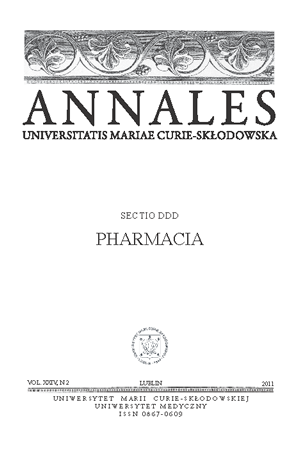Zespół jelita drażliwego: patogeneza, objawy, diagnostyka oraz farmakoterapia
Słowa kluczowe:
zespół jelita drażliwego, IBS, rifaximina, paroksetyna, fluoksetyna, citalapramAbstrakt
Zespół jelita drażliwego (IBS) jest w dzisiejszych czasach sporym problemem medycznym, dotyczącym 10-20% populacji, z czego 2/3 stanowią kobiety. Badania jednoznacznie nie określiły przyczyny tego schorzenia, ale pod uwagę bierze się wpływ diety, stres, wcześniejsze zakażenia bakteryjne przewodu pokarmowego, zaburzenia serotoninowe w układzie pokarmowym, a także czynniki immunologiczne. Objawami charakterystycznymi IBS są bóle brzucha trwające co najmniej 3 miesiące, a także zaparcia lub biegunki, wzdęcia. Częstym objawem u pacjentów cierpiących na IBS są również zaburzenia nastroju i lęk. Stosowane leki z grupy SSRI (paroksetyna, fluoksetyna, oraz citalapram) nie tylko wpływają na polepszenie samopoczucia i poprawę jakości życia, ale jak zaobserwowano, wpływają również pozytywnie na motorykę przewodu pokarmowego, zmniejszają bóle brzucha. Dowodzić to może, że w patogenezie IBS znaczącą rolę odgrywa serotonina, która może stanowić punkt zaczepienia dla nowo odkrywanych i badanych agonistów/antagonistów receptorów 5HT (tegaserod, lubiprostone, alosetron, renzaprid, cilansetron, ramosetron, ME3412), jako potencjalnych leków w IBS. Badanie nad rifaximiną pokazały, że IBS może być konsekwencją wcześniejszej infekcji bakteryjnej, gdyż antybiotyk ten w zastosowanych dawkach wykazywał zmniejszenie objawów towarzyszących IBS i obecnie uznawany jest za jeden z lepszych w leczeniu tej choroby, gdyż nawet 5-krotne przeleczenie nie powoduje zmniejszenia jego efektywności. Teoria immunologiczna jest dopiero na etapie badań i jeśli zostanie potwierdzona klinicznie, być może stanie się skuteczną alternatywą w leczeniu tej jednostki chorobowej.
Bibliografia
1. Ashton H.C.: Benzodiazepine Withdrawal: Outcome in 50 Patients. British Journal of Addiction, 82, 655, 1987.
2. Bijkerk C.J., Muris J.W.M., Knottnerus J.A. et al.: Systematic Review: The Role of Different Types of Fibre in the Treatment of Irritable Bowel Syndrome. Alimentary Pharmacology & Therapeutics, 19, 2004.
3. Fass R., Longstreth G.F., Pimentel M.: Evidence- and consensus-based practice guidelines for the diagnosis of irritable bowel syndrome. Arch. Intern. Med. 161, 2081, 2001.
4. Fayyaz M., Lackner J.M.: Serotonin receptor modulators in the treatment of irritable bowel syndrome. Ther. Clin. Risk Manag. 4, 41, 2008.
5. Holten K.B., Wetherington A., Bankston L.: Diagnosing the patient with abdominal pain and altered bowel habits: is it irritable bowel syndrome? Am. Fam. Physician, 67, 2157, 2003.
6. Hyun S.C., Jae M.P., Chul H.L. et al.: Anxiety, Depression and Quality of Life in Patients with Irritable Bowel Syndrome. Gut Liver., 5, 29, 2001.
7. Kawano K., Mori T., Fu L.: Comparison between partial agonist (ME3412) and antagonist (alosetron) of 5-hydroxytryptamine 3 receptor on gastrointestinal function. Neurogastroenterology and Motility, 17, 290, 2005.
8. Kumar A., Kumar N., Vij J.C. et al: Optimum dosage of ispaghula husk in patients with irritable bowel syndrome: correlation of symptom relief with whole gut transit time and stool weight. Gut, 28, 150, 1987.
9. Lacy B.E., Chey W.D.: Lubiprostone: chronic constipation and irritable bowel syndrome with constipation. Expert. Opin. Pharmacother., 10, 143, 2009.
10. Lunsford T.N., Harris L.A.: Lubiprostone: evaluation of the newest medication for the treatment of adult women with constipation-predominant irritable bowel syndrome. Int. J. Women Health, 2, 361, 2010.
11. Orr K.K.: Lubiprostone: a novel chloride channel activator for the treatment of constipation. Formulary, 41, 118, 2006.
12. Ortiz-Lucas M., Saz-Peirό P., Sebastián-Domingo J.J.: Irritable bowel syndrome immune hypothesis. Part one: the role of lymphocytes and mast cells. Rev. Esp. Enferm. Dig. 102, 637, 2010.
13. Ortiz-Lucas M., Saz-Peirό P., Sebastián-Domingo J.J.: Irritable bowel syndrome immune hypothesis. Part two: the role of cytokines. Rev. Esp. Enferm. Dig., 102, 711, 2010.
14. Pimentel M., Lembo A., Chey W.D.: Rifaximin therapy for patients with irritable bowel syndrome without constipation. N. Engl. J. Med., 364, 22, 2011.
15. Szczeklik A., Gajewski P.: Internal Medicine, 446, 2010.
16. Talley N.J.: Irritable bowel syndrome. Intern. Med. J., 36, 724, 2006.
17. Yong S.K., Suck C.C., Jae M.P et al.: The Effect of Tegaserod on Symptoms and Quality of Life in Korean Women with Irritable Bowel Syndrome with Constipation. J. Neurogastroenterol. Motil., 16, 61, 2010.
Pobrania
Opublikowane
Numer
Dział
Licencja
Prawa autorskie (c) 2011 Autor

Praca jest udostępniana na licencji Creative Commons Attribution-NonCommercial-NoDerivatives 3.0 Unported License.


